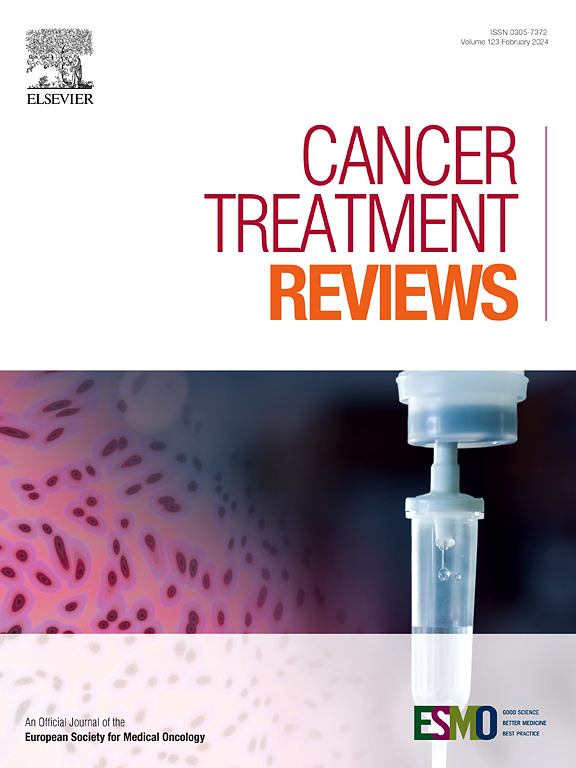Management approaches for recurrent or metastatic head and neck squamous cell carcinoma after anti-PD-1/PD-L1 immunotherapy
IF 9.6
1区 医学
Q1 ONCOLOGY
引用次数: 0
Abstract
Head and neck squamous cell carcinoma (HNSCC) is the seventh most common cancer globally. For patients with recurrent or metastatic (R/M) HNSCC, immunotherapy represents an important advance in clinical practice as an effective and widely used first-line treatment. However, drug resistance following immunotherapy is an emerging problem and, despite the success of immunotherapy in R/M HNSCC, a proportion of patients will become immunotherapy resistant. The mechanisms of immunotherapy resistance are not yet fully understood and subsequent treatment options are limited. Therefore, there is an unmet need for effective and well tolerated treatments for patients who develop immunotherapy-resistant HNSCC.
In this review, we address these challenges by summarizing the current definitions of immunotherapy resistance (primary and acquired resistance) as well as knowledge of the mechanisms of resistance to immunotherapy in R/M HNSCC. We then review available clinical data on treatment strategies, including rechallenge with immunotherapy, chemotherapy ± cetuximab, other targeted treatments, antibody-drug conjugates, and bispecific antibodies. We also investigate future research directions by reviewing ongoing clinical trials.
Our review shows that the optimal therapeutic strategy for patients with R/M HNSCC remains unclear. While many therapies have reported promising preliminary results, prospective clinical trials are required to support their adoption in clinical practice. In particular, it appears that immunotherapy and antibody-drug conjugates have high potential in this setting. Our review also highlights the importance of further investigation of the mechanisms underlying immunotherapy-resistant R/M HNSCC, to inform selection of optimal therapeutic strategies on an individual patient basis and improve patient outcomes.
抗pd -1/PD-L1免疫治疗后复发或转移性头颈部鳞状细胞癌的治疗方法
头颈部鳞状细胞癌(HNSCC)是全球第七大常见癌症。对于复发或转移性(R/M) HNSCC患者,免疫治疗作为一种有效且广泛使用的一线治疗方法,在临床实践中取得了重要进展。然而,免疫治疗后的耐药性是一个新出现的问题,尽管免疫治疗在R/M HNSCC中取得了成功,但仍有一部分患者会产生免疫治疗耐药性。免疫治疗耐药机制尚不完全清楚,后续治疗选择有限。因此,对免疫治疗耐药的HNSCC患者的有效和耐受性良好的治疗需求尚未得到满足。在这篇综述中,我们通过总结目前免疫治疗耐药的定义(原发性和获得性耐药)以及对R/M HNSCC免疫治疗耐药机制的了解来解决这些挑战。然后,我们回顾了现有治疗策略的临床数据,包括免疫治疗、化疗±西妥昔单抗、其他靶向治疗、抗体-药物偶联物和双特异性抗体的再挑战。我们还通过回顾正在进行的临床试验来探讨未来的研究方向。我们的综述显示,R/M型HNSCC患者的最佳治疗策略尚不清楚。虽然许多疗法已经报告了有希望的初步结果,但需要前瞻性临床试验来支持其在临床实践中的采用。特别是,免疫疗法和抗体-药物结合物在这种情况下具有很高的潜力。我们的综述还强调了进一步研究免疫治疗耐药R/M HNSCC的机制的重要性,这有助于在个体患者的基础上选择最佳治疗策略并改善患者的预后。
本文章由计算机程序翻译,如有差异,请以英文原文为准。
求助全文
约1分钟内获得全文
求助全文
来源期刊

Cancer treatment reviews
医学-肿瘤学
CiteScore
21.40
自引率
0.80%
发文量
109
审稿时长
13 days
期刊介绍:
Cancer Treatment Reviews
Journal Overview:
International journal focused on developments in cancer treatment research
Publishes state-of-the-art, authoritative reviews to keep clinicians and researchers informed
Regular Sections in Each Issue:
Comments on Controversy
Tumor Reviews
Anti-tumor Treatments
New Drugs
Complications of Treatment
General and Supportive Care
Laboratory/Clinic Interface
Submission and Editorial System:
Online submission and editorial system for Cancer Treatment Reviews
 求助内容:
求助内容: 应助结果提醒方式:
应助结果提醒方式:


